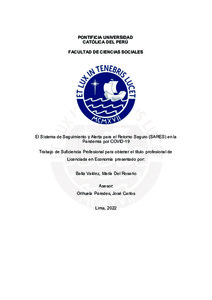| dc.contributor.advisor | Orihuela Paredes, José Carlos | |
| dc.contributor.author | Balta Valdez, María Del Rosario | |
| dc.date.accessioned | 2023-01-13T15:18:33Z | |
| dc.date.available | 2023-01-13T15:18:33Z | |
| dc.date.created | 2022 | |
| dc.date.issued | 2023-01-13 | |
| dc.identifier.uri | http://hdl.handle.net/20.500.12404/23989 | |
| dc.description.abstract | La pandemia por la COVID-19 que inició en el año 2020, trajo consigo el cierre
de las escuelas alrededor del mundo. En el Perú, estas fueron cerradas desde
el 15 de marzo de ese año y el retorno progresivo se empezó a gestar en el 2021.
En ese contexto, el Ministerio de Educación creó el Sistema de Seguimiento y
Alerta para el Retorno Seguro (SARES), conel fin de darle seguimiento al retorno
a clases nivel a nivel nacional y verificar el cumplimiento de las condiciones
estipuladas para minimizar el riesgo de contagio de COVID-19 en las aulas.
El objetivo de este trabajo de suficiencia profesional es explicar el proceso de
retorno flexible, gradual, seguro y voluntario en las instituciones educativas a
nivel nacional en el año 2021. Asimismo, se evalúa cómo la pandemia afectó a
la educación del país. El presente trabajo de suficiencia profesional se basa en
una consultoría finalizada en el mes de enero del 2022. | es_ES |
| dc.description.abstract | The COVID-19 pandemic started on 2020 and closed schools all over the world.
In Peru, schools were closed since March 15th and the students began the
comeback on mid-2021. In that context, the Peruvian Ministry of Education
created the Follow-up and Alert System for a Safe Comeback (SARES) for
monitoring the comeback across the country, which also followed up on the
achievement of the biosecurity conditions to reduce the risk of getting COVID-19
at schools.
The objective of this document is to detail the process of a flexible, gradual, safe
and voluntary comeback in Peru on 2021. It also evaluates how the pandemic
affected the education in the country. The document is based on consultant
research finished in January 2022. | es_ES |
| dc.language.iso | spa | es_ES |
| dc.publisher | Pontificia Universidad Católica del Perú | es_ES |
| dc.rights | info:eu-repo/semantics/closedAccess | es_ES |
| dc.subject | COVID-19 (Enfermedad)--Perú | es_ES |
| dc.subject | Educación--Perú | es_ES |
| dc.subject | Epidemias--Perú | es_ES |
| dc.title | El Sistema de Seguimiento y Alerta para el Retorno Seguro (SARES) en la Pandemia por COVID-19 | es_ES |
| dc.type | info:eu-repo/semantics/bachelorThesis | es_ES |
| thesis.degree.name | Licenciado en Economía | es_ES |
| thesis.degree.level | Título Profesional | es_ES |
| thesis.degree.grantor | Pontificia Universidad Catolica del Peru. Facultad de Ciencias Sociales | es_ES |
| thesis.degree.discipline | Economía | es_ES |
| renati.advisor.dni | 06785398 | |
| renati.advisor.orcid | https://orcid.org/0000-0002-2999-5561 | es_ES |
| renati.author.dni | 70615850 | |
| renati.discipline | 421016 | es_ES |
| renati.juror | Muñoz Portugal, Germán Guillermo Ismael | es_ES |
| renati.juror | Silva Macher, José Carlos | es_ES |
| renati.juror | Orihuela Paredes, José Carlos | es_ES |
| renati.level | https://purl.org/pe-repo/renati/level#tituloProfesional | es_ES |
| renati.type | https://purl.org/pe-repo/renati/type#trabajoDeSuficienciaProfesional | es_ES |
| dc.publisher.country | PE | es_ES |
| dc.subject.ocde | https://purl.org/pe-repo/ocde/ford#5.02.01 | es_ES |






